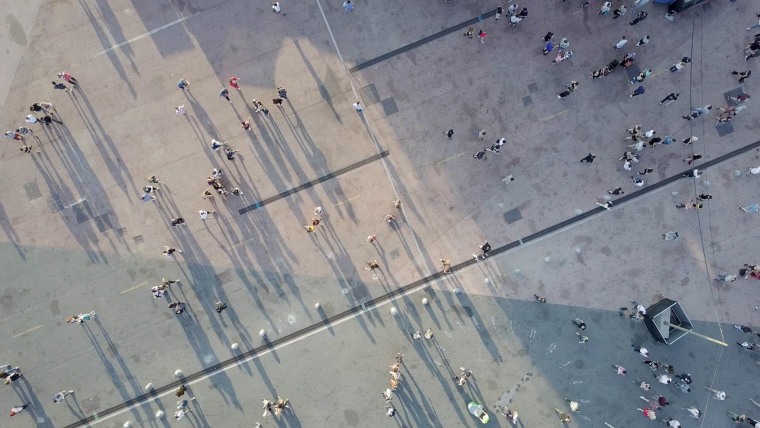At 1st it felt like a normal side influence of being utilized. But buried beneath nicely-intentioned suggestions to “unplug from function!” and “get pleasure from your downtime!” came the unsettling realization that taking time away from get the job done, be it a weekend or a working day off for a doctor’s appointment, felt pretty much far more anxiety-inducing than the workweek itself. How can I take a split when I am fearful that a day off will direct me to tumble driving and reduce my work?
It is turn out to be crystal clear this isn’t just a paranoid quirk certain to overthinkers performing a number of careers, like me.
Two decades ago, when I identified myself in the crisis room hoping to e mail my manager, I was struck by how my literal health and fitness emergency was not creating me anxious — but my work was. What if I could not make it to perform the future working day? How lots of hours would I shed, and how would I shell out for this without employer-provided health and fitness insurance policy? Because then, it’s turn out to be distinct this is just not just a paranoid quirk distinct to overthinkers functioning a number of work, like me. It feels like a operate of society’s operate precariousness.
A new 12 months provides new pledges to increase our function-lifetime equilibrium amid chipper reminders not to make do the job your total lifestyle. But it is the precariousness that has to be solved first. You can not outrun stress and anxiety about using time off without having addressing the procedure that makes and perpetuates that anxiousness.
It is really not possible to divorce this precariousness from capitalism, which includes the embedded disparities in our workforce and perform-related guidelines. If you might be too fearful about losing your work or acquiring your several hours slice to just take a weekend off or choose a breather, it helps make sense that you’d just maintain functioning. It really is nearly as if that’s by style and design.
“It is really not genuinely having a break if you are not absolutely sure if you will have a task or enough shifts or freelancing clients when you return to function,” Nisa Malli, a researcher at the Brookfield Institute for Innovation and Entrepreneurship, explained to me, outlining that this can unquestionably increase the stakes and make getting time off a lot more nerve-racking — primarily in industries in which you have to jockey to get sufficient shifts — for deal or freelance staff or when peak need for your market coincides with holiday seasons. Malli described that, as of November, all over 6.7 million individuals were being employed portion time in the U.S. who would like to operate comprehensive time — up by 2.5 million folks since February.
Even for those with relatively secure or complete-time work, Malli explained, without the need of paid out ill times or holiday, using a crack indicates a decline of earnings. “So this idyllic fiction of obtaining a stress-free summer months getaway or time off with your loved ones in excess of the winter season break is a tale we inform ourselves about our doing the job life and one that’s mirrored back again at us by videos and Television set that just merely is not correct for a lot of staff in North The united states,” she stated.
So although anxiousness about taking time off has an effect on a great deal of staff, some working experience more tangible penalties than other individuals. For gig staff or contract staff, getting a break can pretty much necessarily mean reduction of earnings for those people in assistance operate, the reduction of a change or ideas can be harmful even those doing the job some variation of 9-to-5 work that permit for distant do the job truly feel the panic that comes from figuring out their work may not exist shortly — or that they’re inherently replaceable.
And that doesn’t even component in unemployment figures or how quite a few persons are anxious over currently being unable to uncover perform at all. There’s now exploration on uncertainty-associated stress about returning to workplaces all through the pandemic, while hundreds of workers’ positions or hrs have been slashed, even as they danger their lives to go to function pursuing months with no considerable federal money reduction or hire relief. Look how long it took Congress to pass even the most essential Covid-19 assist bill in December.
The disparities operate even deeper: Investigate reveals that Black workers’ added benefits are a lot less likely to involve compensated sick times and the potential to do the job from house, and in accordance to details from the Economic Plan Institute, access to compensated unwell times is “vastly unequal.” And that’s just about ill times.
“Take time for yourself!” may seem great in concept, but not if losing a change indicates not beco
ming capable to pay back your rent “work isn’t everything!” falls a small flat when your manager threatens your job every single time you do not reply to a late-evening email in a timely sufficient trend. For lots of Individuals, function is created up of inequities stacked on inequities, like a warped activity of Jenga in which human beings are the pieces.
Individually, I am constantly on significant alert. What if having the total weekend off can make me appear unproductive or disengaged to my boss or co-employees? I have missing enough jobs to know I’m replaceable. And but, for a great deal of workers, time off of any type, even times they technically “have off,” is extremely hard.
Orli (who asked that her very last identify not be utilised to shield her privateness), 36, a nurse performing on a Covid-19 flooring, mentioned: “We will not get enough breaks. We really don’t get plenty of staff members to help. We go house and we still listen to the pumps beeping and the people yelling.” Orli was off for three times not long ago to take ultimate exams for a master’s plan to turn into a family members nurse practitioner. But she experienced to struggle to get individuals times — she wasn’t authorized any paid time off through December, and her manager refused to allow her get unpaid time. She finished up switching days with co-employees to make it take place.
It can be a grueling fact partly obscured by employer encouragement. The tips not to verify e-mail on weekends and to get time for your self seems, on the floor, fantastic and vital — if we aren’t reminding ourselves and 1 a further of these points, who will? But the comply with-by way of is flimsy, placing the burden back again on employees to develop breaks when they can and consider them at their own chance.
And if we are always apprehensive about possessing get the job done, we are going to often be working. When I questioned M. Gloria González-Morales, an affiliate professor of psychology at Claremont Graduate University, about what very well-being implies in the context of perform, she explained by using e-mail that “if we are stripped of the assets that we want to do our function or to are living a first rate existence, there is not a wholesome partnership with a scenario that gets rid of methods from your pool devoid of replenishing them.”
In other words and phrases, the precariousness has to be solved first normally it is really like striving to develop a house without the need of a basis. As well as, most of the research in phrases of the elusive thought of function-daily life stability, González-Morales mentioned, arrives from studies of white-collar expertise workers.
The guidance not to verify email on weekends and to get time for yourself looks, on the floor, very good and necessary. But the adhere to-via is flimsy.
“Sad to say, there are numerous personnel (essential staff, staff in blue-collar jobs, least-wage personnel, gig employees) for whom the thought of operate-life balance is utopic,” González-Morales explained. In regard to this pressure, specified the inequalities and discrimination embedded in the tradition of work, it “prospects to employees from traditionally marginalized groups, these as women of all ages, LGBTQ+ and POC, questioning their employability and their capacity” to do well and continue to keep their jobs much more often than non-marginalized employees. That adds up to a additional stress filled working experience, which has to be managed. But investing psychological and emotional strength in holding your head higher than h2o can drive you even further, González-Morales reported.
Preserving us anxiously tethered to perform makes certain we are going to keep working, since, for a ton of men and women, is there genuinely a different selection? We require a sound security internet, Brookfield researcher Malli told me, one particular that guarantees that getting rid of cash flow or work does not have cascading outcomes on housing stability or overall health stability. “If your work is tied to your well being insurance plan and your capacity to continue to be in your apartment, any conclusions that set that at chance, even like it gives you the feeling that it is at risk, will become substantially additional bigger-stakes, mainly because it has a cascading result on every single other aspect of stability in your lifetime,” Malli claimed.
That prolonged-shot get to for safety is tethered to this anxiety — and the solution just isn’t to remind staff to just take breaks that can truly feel not possible. When we know the vacations are significantly from a family vacation for numerous, which include all those carrying out unpaid labor as caregivers, January and the dawn of a new 12 months offer a wealth of messaging all over self-treatment: how to change our anticipations and regulate our anxieties, even although the programs that worsen them usually are not changing at all how to treatment for ourselves simply because we know the powers-that-be would not how to carve out time for you in the midst of a daily life that seems, much too generally, dependent on work. The pandemic is just not disappearing in 2021, and neither is the will need to reconsider operate procedures and buildings that will not so tightly tie our time, truly worth and lives to our work opportunities. This is a problem that will not be fixed by reminders to “make time for you.”



:quality(80))




